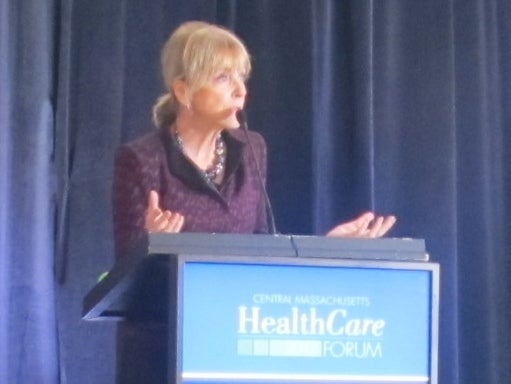Attorney General Martha Coakley told a gathering of businesspeople in Worcester today that she is confident the state’s efforts to curtail rising health care costs will work.
Coakley has helped lead the charge against rising costs by studying cost disparities among hospitals for the same procedures, a process she likened during her recounting of the state’s efforts to “looking under the hood” of the industry.
“We believed that cost growth was unsustainable, but not insurmountable,” Coakley said.
Her remarks came at a health care forum hosted by the Worcester Business Journal at Coral Seafood.
View photos from the forum here.
Coakley told the roughly 200 attendees that the state’s goal is to hit a “sweet spot in healthcare; where we know the difference between what we need and don’t need and we have the ability to pay for it.”
She said a state law passed this summer to control costs will mandate that providers are transparent about the costs of procedures and services and about whether insurance will cover them or not.
But Coakley said that consumers also need to be more responsible about their health, and said she hears complaints about the state’s efforts that she thinks are exaggerated.
“There’s a lot of overreaction, that the state is a ‘nanny state,'” she said. “There’s an incredible reaction every time someone says ‘we’re going to regulate.'”
During a Q&A after Coakley’s speech, one audience member asked how true clarity and choice could be brought into such an emotionally fraught situation, such as a dire diagnosis of a family member.
Using the example of her own mother, who died of leukemia, Coakley said her family didn’t fully understand their mother’s treatment options, and may have chosen hospice care rather than a slew of hospital tests if they had been presented with a clearer slate of options.
Another audience member asked Coakley how patients could be educated about making responsible decisions about their own health.
Coakley said that teams of health care professionals, under an “accountable care organization” model, could act as a team to give a push to patients who are not following their doctor’s instructions.
In a panel discussion that followed the attorney general’s remarks, four panelists and the discussion moderator, Fallon Community Health Plan President and CEO W. Patrick Hughes, addressed the short-term future for health care consumers and providers amid the passage of the state’s cost-containment law and the nationwide individual insurance mandate scheduled to take effect in 2014 as part of the Affordable Care Act.
“We need to think about how to provide health” rather than just merely cure ailments, said Dr. David Fairchild, senior vice president for clinical integration at UMass Memorial Health Care. “How do we keep our population healthy?”
The answer, he said, lies in having a “patient-centered” approach rather than one that focuses on providers. As an example of the latter, he cited a diabetes patient who sees his primary care physician, who then refers him for appointments with four specialists. But a big challenge for health-care providers, he added, is making sure patients do what their doctors suggest as part of their care regimen.
“It is difficult when I hear that patients … are non-compliant,” he said.
State Sen. Richard T. Moore, a panelist and a principal architect of health care reform in Massachusetts, told the gathering that businesses can help by promoting wellness among their employees. That, he said, can help push down costs. The Uxbridge Democrat also cited important changes in medical malpractice law as another key to taming costs. More specifically, he cited the development of a more effective system that includes documenting medical errors to act as teaching tools in medical schools on how to avoid such errors in the future.
Read more
Part Of Hospitals’ Medicare Payments To Be Tied To Patient Satisfaction

